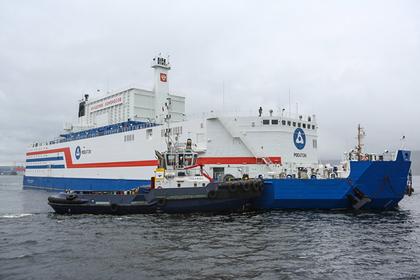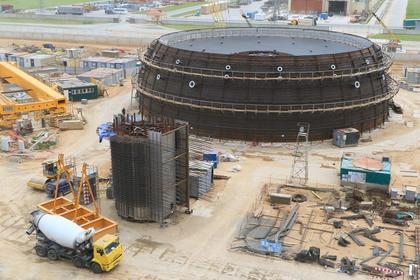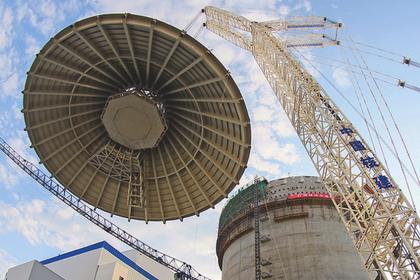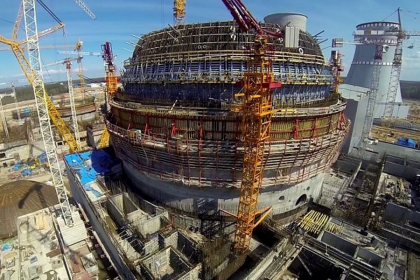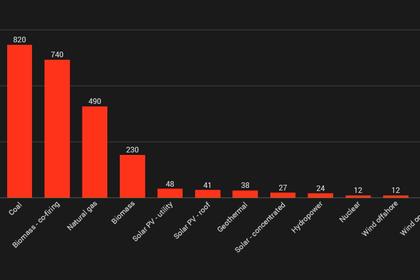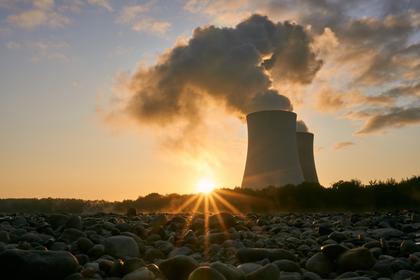
MIDDLE EAST NUCLEAR POWER
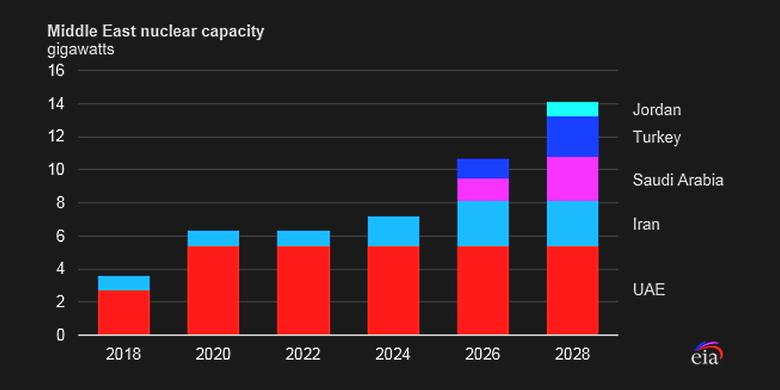
PLATTS - 11 Nov 2020 - While the UAE started its first nuclear reactor this year, other countries in the Middle East are stuck in their plans as they grapple with financial constraints, uranium enrichment aspirations, and Western fears amid Iran's controversial nuclear ambitions.
The UAE, so far, is the only regional country to have agreed to the so-called "gold standard" in its nuclear cooperation agreement with the US, foregoing any plans to enrich uranium, which is the West's main cause of concern.
The UAE's peaceful program includes four 1.4 GW nuclear reactors, the first of which started in August, to meet up to 25% of the country's electricity needs.
"The question of deployment of sensitive nuclear technologies has been a hot button issue in the Middle East for years, beginning in 1970s when Israel clandestinely produced nuclear weapons and the rest of the countries in the region had to respond to that development," said Mark Hibbs, senior fellow at the Carnegie Endowment for International Peace's nuclear policy program.
"Nuclear transparency issues in the Middle East are not confined to just to one or two or three countries but are the concern of virtually all states in a region where suspicion is widespread and where international cooperation and confidence building are limited."
Saudi nuclear plans
In Saudi Arabia, earlier scenarios to develop 17.6 GW of nuclear power by 2032 have been scaled back to building a mix of 1.2-1.6 GW and small modular reactors without any set timeline.
However, the West has concerns about the Saudi program because of its stated intentions to mine and enrich its uranium deposits.
In a March 2018 interview with CBS, Crown Prince Mohammed bin Salman said, "Saudi Arabia does not want to acquire any nuclear bomb, but without a doubt if Iran developed a nuclear bomb, we will follow suit as soon as possible."
Such statements have unnerved Western countries, including some US lawmakers, who have urged the US Administration to persuade Saudi Arabia to agree to the "gold standard" and foreswear enriching uranium.
"Saudi Arabia is doing its best to try and get the best deal possible with regards to the construction of nuclear reactors, not just from a financial and monetary standpoint, but also from minimizing the types of non-proliferation restrictions that it is going to have to accept - and the United States has been pushing for - but that countries like China and Russia don't push for," said Eric Brewer, deputy director of the Project on Nuclear Issues at the Center for Strategic and International Studies.
Resource-barren Jordan
Turkey, which has a so-called 123 nuclear cooperation agreement with the US just like the UAE, is building its first nuclear plant Akkuyu, which will consist of four 1.2 GW reactors being supplied by Rosatom, with work on the first unit set to start in 2023.
Egypt, which also has a 123 agreement, has long envisaged having a nuclear power plant, but its plans were stymied by financial constraints.
However, Russia has agreed to finance 85% of the $29 billion construction cost of the El Dabaa plant, which will comprise four 1.2 GW reactors. The first unit is set to start operation in 2026.
Similarly, resource-barren Jordan needs financial help to achieve its ambition to produce nuclear energy to help halt its reliance on energy imports. Jordan, which in 2015 signed with Rosatom a $10 billion deal to build a 2 GW nuclear power plant, has since scrapped this plan and is looking at small modular reactors.
Financial constraints
Jordan also wants to mine and enrich its own uranium deposits, which is another sticking point with the US in reaching a 123 agreement.
"Finances is likely to pose the biggest obstacle to fulfilling these [nuclear] dreams because nuclear energy is such a costly venture," said Mark Fitzpatrick, associate fellow at the International Institute for Strategic Studies.
"If you look at it in terms of energy efficiency, nuclear energy is not the most efficient way of developing electricity. Solar energy probably offers better efficiency in the long-run, while in the short-run because of the depressed price of oil, countries are finding it more economic to just import oil."
However, the elephant in the room that may thwart the region's nuclear ambitions is Iran, which started in 1959 with a small US nuclear reactor but ended up entangled in a major standoff with the West in the 2000s.
Iranian threat
To rein in Iran's nuclear aspirations, China, France, Germany, Russia, UK and the US reached in 2015 an agreement with Tehran that helped stop it from developing a nuclear program beyond power generation.
However, the US in 2018 withdrew unilaterally from the Joint Comprehensive Plan of Action, demanding new conditions from Tehran.
Iran, which started its first 1 GW Bushehr nuclear power plant in 2011, plans to nearly triple production by 2027 with the help of Rosatom.
Besides Iran, another cause for concern is the potential attack on nuclear facilities.
"Modern nuclear power plants are designed to be secure against most kinds of threats but they can't be perfectly secure against threats such as an airplane directly attacking the plant...or in the case of an attack like the Israeli attack on Iraq's Osirak reactor [in 1981]," Fitzpatrick said.
-----
Earlier:
